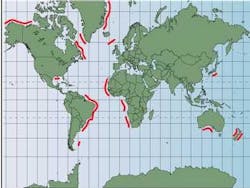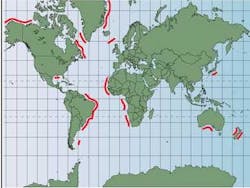Expanded operating envelope creates new frontiers
The operating envelope of the offshore oil industry continues to expand both horizontally, away from the coasts, and vertically, through deeper seas and deeper rock sections. The technology of marine exploration brings amazing and substantial tools to bear on the problem of remote imaging, drilling, and producing. Standard 2D seismic surveys are still used for regional trend and prospect development, but are often supplemented later by 3D surveys. For many frontier areas, 3D coverage is becoming so common as to be expected by the major companies. It is often more cost effective to spend the money upfront on better imaging.
Improving acquisition technology coupled with better imaging and visualization tools now permit operators to look deeper into the sediments, look under and through salt structures, and unravel complex tectonics at depth.
Improvements in vessel technology push the operating envelope into deeper water depths. At the same time, drilling technology makes it possible to drill deeper.
Mature frontiers
Successful exploration continues to find large reserves in deeper offshore waters, but a developing theme for established areas is examining new trends, known but poorly examined trends, and deeper structures beneath established plays. While this pursued in most mature areas, the Gulf of Mexico and the UK encourage explorers to take another look.
In the Gulf, the industry is being encouraged to revisit the established shelf region, but to look deeper. This policy change was instituted to re-attract the majors to the shelf.
The UK Department of Trade and Industry has identified six plays that are new frontiers for explorers to test. These plays tend to have smaller reserves, making them better suited for independent oil companies.
Political frontiers
Even as the technical ability to operate in deeper waters improves, there are other barriers that limit the offshore operating envelope. Political differences between coastal states still keep many disputed exclusive economic zones (EEZs) closed to exploration. Provision exists in the Law of the Sea Treaty to resolve such disputes.
Many proactive countries have established treaties to open these disputed areas to development and remove this restriction without any renunciation of maritime sovereignty by the adjoining states. Most joint development zones (JDZs) are operating smoothly, providing continuing opportunity for the industry.
Nigeria and São Tomé & Príncipe recently overcame their territorial dispute and created a JDZ. They expect to offer licenses later this year.
Regional frontiers
The world is full of new frontier areas waiting for explorers with the frontier mindset. Here are a few places to consider:
Polar areas: The regions at either pole hold much potential, but the cost and logistics of operating in the harsh climate is keeping development to a minimum. Antarctica is off-limits by international treaty. While the broadest expanse of arctic water-covered shelf is across northern Russia, it is not open to the international oil companies. The areas that are truly available are off Alaska, northern Canada, and Greenland.
To help open the polar regions, the Integrated Offshore Drilling Program will gather basic geological data in these waters over the next 10 years. This will improve understanding of the rock systems and their potential. It will also focus the industry's attention on the most prospective areas.
North and South America: In addition to Alaska and Canada, the waters off Greenland hold potential in the Davis Strait. Successful development off Newfoundland points to promising frontiers farther north along the coast in the Labrador Sea.
Moving south, a new deepwater frontier area in the eastern Gulf of Mexico was opened for licensing this past year. In addition, the Texas and Louisiana shelves received incentives to encourage exploration and testing of deep structures in shallower waters.
The opening of Brazil continues to offer many new frontier basins for explorers. These include shelf plays as well as new deepwater areas. In the far south, the Falkland Islands provide frontier opportunities on the Malvinas Shelf. More drilling is needed in the northern region, and the southern blocks have not been tested.
Europe and Africa: Europe's remaining frontiers are in the harsh waters of the northern Atlantic Ocean and the Norwegian Sea. The recently settled "White Zone" dispute opened the area south of the Faeroe Islands and west of the Shetland Islands as a new frontier. Norway's northern deepwater structures are another area of interest that has received light attention. The respective governments provide incentives to companies willing to accept the exploration risk.
Farther south off West Africa, new areas of Morocco and Senegal are attracting interest. Though little explored, substantial discoveries elsewhere off West Africa prove the potential of the Atlantic side of the continent.
Southeast Asia: The Great Austra-lian Bight off southern Australia continues to hold great promise, though it has not yet received much drilling. Two major fan systems were delineated at the recent AAPG convention demonstrating their potential. The delta fans show all the features expected of a future major oil production province.
New Zealand's northwestern Taranaki Basin is well known, but the eastern side has received little attention. The continental shelves off both islands hold plenty of promise and will reward some explorer soon. New Zealand expects its legal EEZ to expand as a result of new bathymetric surveys.
Conclusion
Exploration is a state of mind as well as hard science. It practices curiosity, open-mindedness, and optimism for the potential of unlikely or difficult regions. It is this mindset that opened the recent frontiers off Brazil and West Africa. It is the mindset that will continue to open the expanding envelope of opportunities to those "frontier-minded" offshore explorers.

